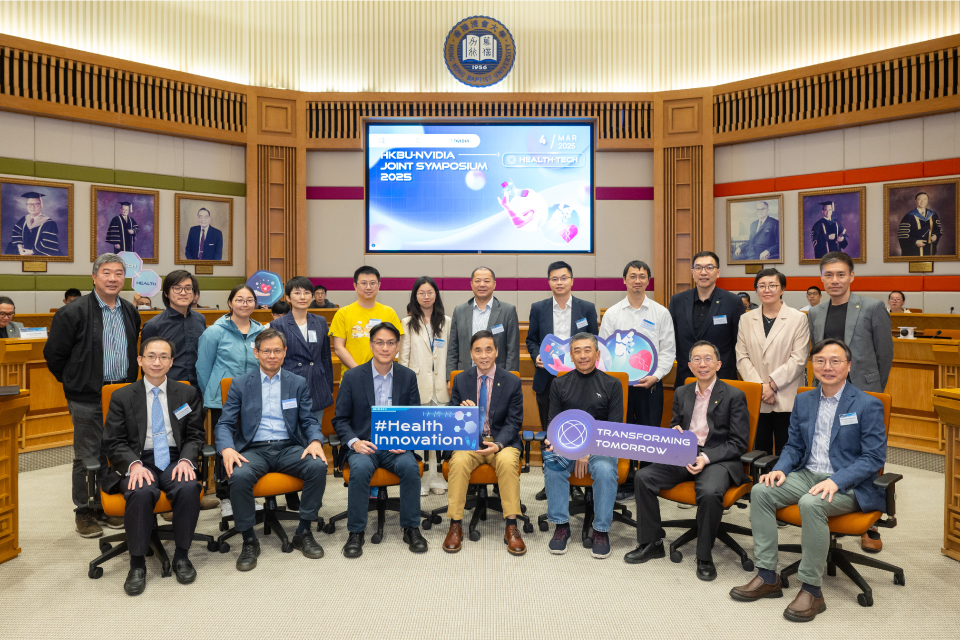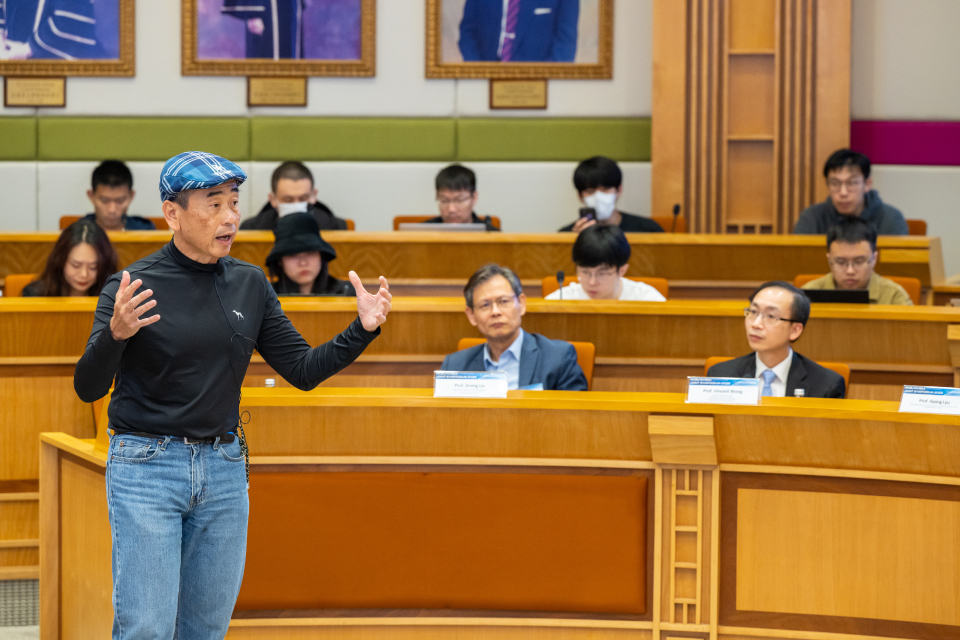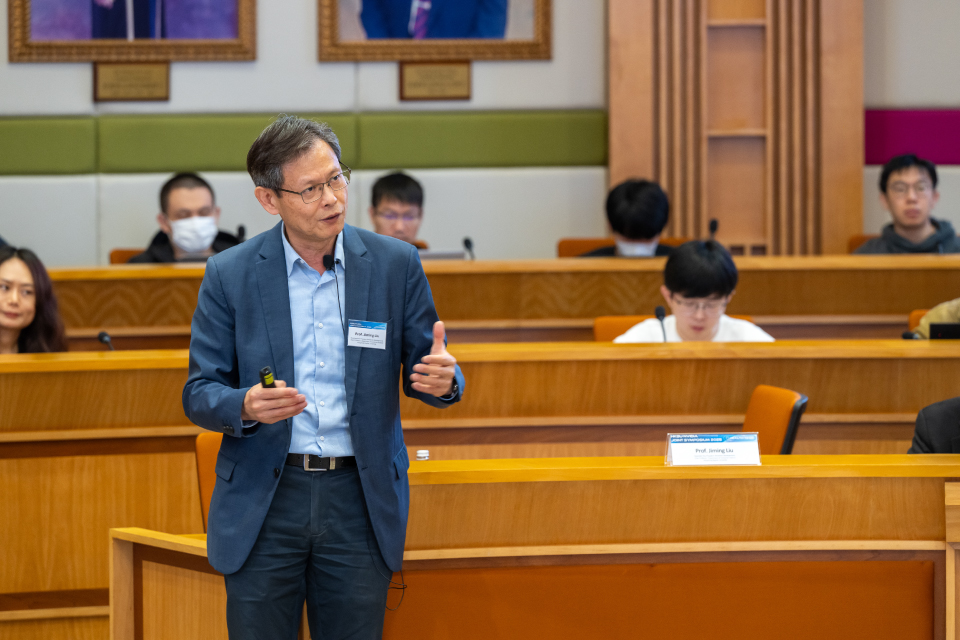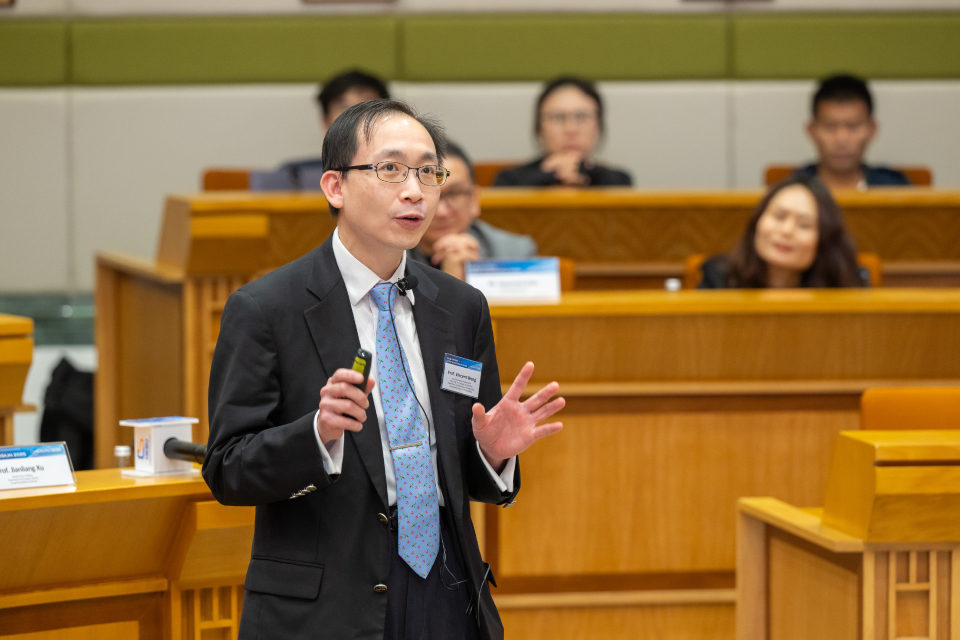Discover HKBU
Enhancing healthcare through AI: A transformative approach to diagnosis, treatment and public health management
31 Mar 2025


The HKBU-NVIDIA Joint Symposium 2025 concluded on a high note on 4 March, as thought leaders and industry experts discussed how AI has transformed the healthcare sector through promising advancements in diagnosis, treatment and public health management. Professor Lyu Aiping, Vice-President (Research and Development) and Dean of the Graduate School at HKBU, gave a warm welcome to the attendees before passing the floor to the 12 distinguished speakers, who enlightened everyone with their insights into advanced medical technologies.
Addressing healthcare challenges with AI
Professor Simon See, Global Head and Chief Solution Architect at the NVIDIA AI Technology Centre, opened the keynote session with astute observations about the pressing healthcare challenges. Against a backdrop of rising expenditures, growing disparities, and a critical shortage of healthcare professionals, AI emerges as a beacon of hope to enhance diagnosis and treatment.
“The rise of generative AI over the past 18 months has opened up exciting possibilities, allowing us to capture diverse data through generative neural networks. How we’re going to resolve this problem is that we can look at how AI can be used, together with a mix of what we’ve advanced in medicine,” Professor See said.
In particular, imaging technologies have transformed the diagnostic process for conditions like cancer, facilitating earlier and more accurate detection. This advancement is crucial, as timely diagnoses can significantly affect patient outcomes and treatment efficacy.
Professor See also introduced a pioneering platform developed by NVIDIA designed to optimise foundational models for drug discovery. Harnessing AI technology, NVIDIA facilitated the seamless integration of software and hardware, thereby streamlining workflows within trial laboratories. This innovative approach enables scientists to conduct their treatments with greater speed and efficiency.
AI in public health and risk mitigation
Professor Jiming Liu, Associate Vice President of Research Development at HKBU and Chair Professor in Computer Science, made a compelling presentation about the intersection of data analytics and public health, underscoring the importance of AI-driven tools in managing infectious diseases.
Densely populated cities are at higher risk for rapid disease transmission due to unique demographic and environmental factors. Professor Liu underscored the necessity of preparedness, advocating for an agile response system that can adapt to evolving threats. To mitigate these risks, he proposed a framework involving four key phases to enhance urban health responses: risk prevention, early warning, targeted intervention, and emergency response. He elaborated on various AI-driven tools that can facilitate these phases, including disease risk mapping, transmission dynamics modeling, and scenario analysis, which help predict outbreaks and manage healthcare resources effectively.
"This is a case where we must ensure that targeted interventions are effectively implemented. As we progress further, we may encounter outbreaks that necessitate a highly effective emergency response. In the context of public health, the importance of data-driven strategies cannot be overstated," emphasised Professor Liu.
Precision medicine: AI in liver disease management
Chronic liver diseases, which pose significant health risks globally, require effective early detection and intervention. Traditional biopsy methods are often invasive and can lack consistency, prompting the need for innovative solutions. According to Professor Vincent Wong, Assistant Dean (Development) and Mok Hing Yiu Professor of Medicine in the Department of Medicine and Therapeutics at The Chinese University of Hong Kong, the application of AI in managing liver diseases not only exemplifies the shift toward precision medicine but also enhances digital pathology assessments, improves the accuracy of liver disease evaluations, and reduces the need for invasive procedures.
An AI-empowered future
By improving diagnostic accuracy, streamlining drug discovery, and enhancing public health responses, AI holds the potential to tackle the challenges faced by healthcare systems worldwide. However, as Professor See pointed out in his keynote, it is crucial to remain vigilant about the ethical implications and governance of AI technologies. The Symposium serves as an important platform to remind everyone that AI-enabled healthcare transcends mere technology; it also requires us to re-imagine how we deliver care in a world that increasingly demands innovation, efficiency, and empathy, and that we do not lose sight of these essential values in our quest for progress.


